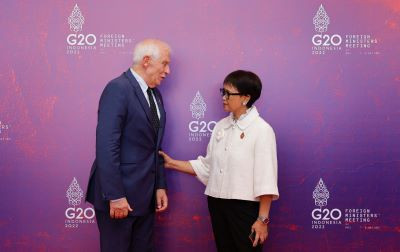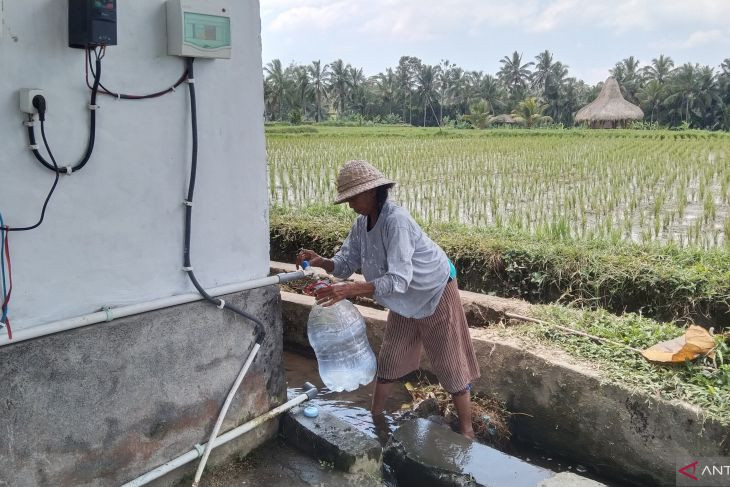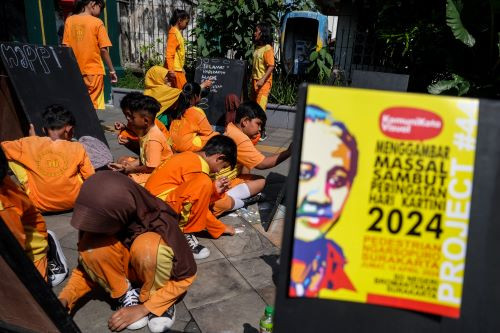Why 'Saber Pungli' was Jokowi’s greatest move
While the Corruption Eradication Commission (KPK) was established more than a decade ago with a goal to catch high-ranking public officials involved in corruption cases, no one had come up with a concrete solution for how to tackle the long-ingrained practice of illegal levies in Indonesia’s public service delivery.
Change Size
 Saber Pungli: A revolutionary program to tackle the long-ingrained practice of illegal levies in Indonesia’s public service delivery. (Antara/Basri Marzuki)
Saber Pungli: A revolutionary program to tackle the long-ingrained practice of illegal levies in Indonesia’s public service delivery. (Antara/Basri Marzuki)
O
vershadowed by a series of rivalries between some of his ministers that led to a second Cabinet shake-up, the stubborn economic slowdown and nationwide protests over Jakarta Governor Basuki “Ahok” Tjahaja Purnama’s blasphemy case, it is easy to assume that 2016 was not a year President Joko “Jokowi” Widodo feels proud of.
But the fact of the matter is that last October the President launched a special nationwide task force to tackle frustrating illegal levies, called Saber Pungli, a revolutionary program at least from the Indonesian bureaucratic point of view — something that Jokowi can feel great about.
While the Corruption Eradication Commission (KPK) was established more than a decade ago with a goal to catch high-ranking public officials involved in corruption cases, no one had come up with a concrete solution for how to tackle the long-ingrained practice of illegal levies in Indonesia’s public service delivery.
The practices are so common that people have become permissive of them, thinking it is normal to hand over a little bit of money as a “gift” to smooth the process of, let’s say, obtaining an identity card or driver’s license. It was only natural for the President to try to institutionalize the fight against illegal levies through the creation of Saber Pungli, which has received more than 17,000 reports in the two months since its formation.
Jokowi spent years working as a furniture businessman before he decided to enter politics.
As a former businessman, he knows too well that doing business in Indonesia is too complicated and costly due to the illegal fees that businesspeople have to pay in order to receive necessary documents.
Thus, improving the ease of doing business has become an important part of Jokowi’s economic policy. So far the government’s efforts to achieve that have shown promising results. Indonesia ranked 91st in the World Bank’s last Ease of Doing Business index, an improvement of 15 notches from the previous survey.
During the 2014 presidential election, among other things, Jokowi described the need for a mental revolution.
A mental revolution program was launched by the government in 2015 under the Office of Coordinating Human Development and Culture Minister. After more than a year, the public remains puzzled about the program’s vision, its blurry implementation plans and how it will benefit the people.
Meanwhile, the Saber Pungli initiative has clear practicality and it rightly aims to fix the ongoing cultural epidemic.
Having said that, it is safe to say, in my opinion, that for the President the campaign is the closest thing to the mental revolution he promised during the election.
Considering that the culture of illegal levies is widespread, a common practice throughout the country, an out-of-the box approach is indeed needed to eradicate it.
And it seems that the ad-hoc task unit was launched by the President with this mindset.
While enforcing a special antiillegal levies unit in every ministry and government institution, the government is also encouraging local administrations to create similar teams, all under the leadership of the central supervision body led by the coordinating political, legal and security affairs minister.
It’s too early to call the program is a success, of course. We should all, however, have confidence that the government is really committed to ending illegal levies.
Entering the new year, a big task awaits the government. The President and his men must be able to prove that this is not just a political PR stunt, that they mean business.
In the short-term, the government’s success will be judged on how effective coordination between the central government, provincial governments and city administrations can be maintained. That is definitely not an easy job, as Indonesia is well known for its hellish bureaucracy.
To materialize it, Jokowi must muscle out his leadership and negotiation skills, convincing all parties that the success of the program is not only good for the people but also good for the government. As with other things in a democratic nation, public participation is too important to ignore.
After all, it is public satisfaction that the program was built to achieve. And with the explosion of mobile users in Indonesia, the use of technology is a factor that we cannot overlook.
To do this, the central government may need to learn from the success of the Jakarta administration’s smartphone app Qlue, which gathers complaints from the city’s residents.
The app is reportedly being used by hundreds of thousands of users, resulting in thousands of reports on a daily basis.
Integrating local administrations’ e-government systems with a central platform might also be a good idea, providing a large database that will prove valuable for the central government to use later in formulating future strategy.
Lastly, the fight against illegal levies should never be a one-sided battle. The dream of ending illegal levies in Indonesia will not be possible if the people themselves do not object when they are asked to pay fees beyond what is legally requested.
A long-term approach is needed, raising people’s awareness about their right to good public services without paying extra.
Historians will tell you that all presidents, including Jokowi, spend significant amounts of time thinking about what kind of legacy they want to give leave for their people when they are no longer in power.
With three more years to go as the country’s CEO, Jokowi surely has one item to put on his legacy list. If he succeeds, he will be remembered for many years to come and by millions of people as the president that removed illegal levies.
An out-of-the box approach is indeed needed to eradicate illegal levies.
---------------
We are looking for information, opinions, and in-depth analysis from experts or scholars in a variety of fields. We choose articles based on facts or opinions about general news, as well as quality analysis and commentary about Indonesia or international events. Send your piece to community@jakpost.com. For more information, click here.









